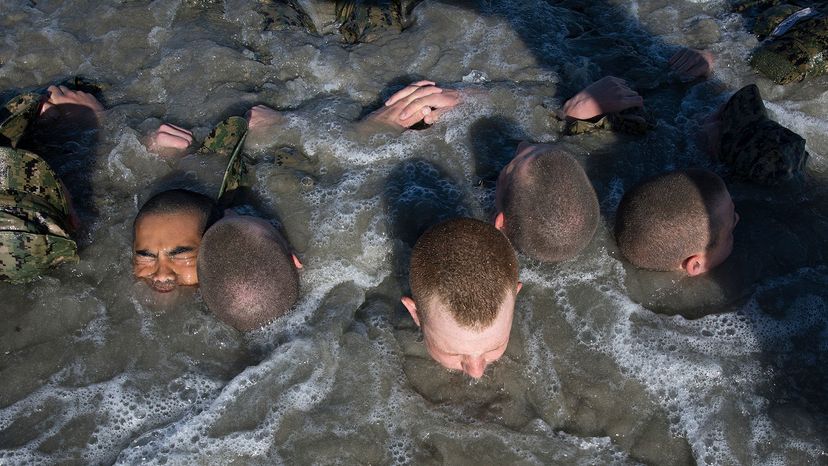BUD/S Training: Hell Week

The fourth week of basic conditioning is known as Hell Week. This is when students train for five-and-a-half days with a maximum total of four hours of sleep. Hell Week begins at midnight Sunday and ends Friday afternoon. During this time, trainees face continuous training evolutions. During Hell Week, trainees get four meals a day — sometimes MREs, but usually hot meals of unlimited quantities. Eating hot food is a substitute for being warm and dry. It gives a needed psychological boost to tired trainees, many of whom are nearly sleeping while they eat.
Pretty much every evolution during Hell Week involves the team (or boat crew) carrying their IBS— inflatable boat, small — over their heads. Timed exercises, runs, and crawling through mud flats are interspersed throughout the five-and-a-half days. Only about 25 percent of SEAL candidates make it through Hell Week. This extreme training is critical, though. SEALs on missions must be able to operate efficiently, oblivious to subzero temperatures and their own physical comfort. Their lives, as well as the lives of others, may depend on it.
Advertisement
Listening closely to orders is another critical element of training during BUD/S, particularly during Hell Week when brains are getting fuzzy from lack of sleep. The instructor may purposely leave out part of an order to see who is really listening. For example, during a series of orders requiring trainee teams to do exercises using a 300-pound (136-kilogram) log, he may leave out mention of the log for one order. Team leaders who are paying attention will catch this, and their team gets a small break in the difficulty of the task by performing it without having to carry the log. The instructor might reward the team by allowing it to stand by the fire and rest or sit and sleep for a few minutes.
If a candidate can't take it anymore, all they have to do is approach a bell that's been erected on the training ground and ring it. Ringing the bell signifies defeat and they're out. SEAL candidates might feel the worst part of Hell Week is physical but the mental part is just as important. As NavySEALs.com puts it, "While instructors could get anyone to quit if they wanted to, that's not what they're after. They apply great physical and mental stress, sow the seeds of doubt, and give tempting invitations for trainees to quit. It's up to the individual student to either turn it into increased resolve or decide on his own to quit. The majority of the students who make it through Hell Week go on to graduate BUD/S and become SEALs."